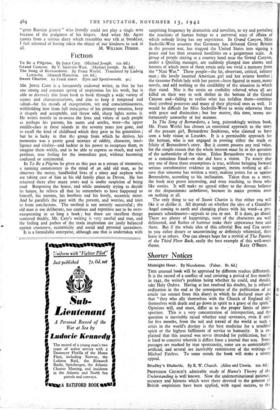Fiction
The Song of Bernardette. By Franz Werfel. Translated by Ludwig
Lewisohn. (Hamish Hamilton. los. 6d.) Sweet Chariot. By Frank Baker. (Eyre and Spottiswoode. 9s.) MR. JOYCE GARY is a fortunately endowed writer, in that he has one strong and constant spring of inspiration for his work, but is able to diversify this from book to book through a wide variety of scenes and characterisations, and also to keep it tempered and salted—for his moods of exasperation, wit and conscientiousness, withholding him from full indulgence of his primary emotion, keep it shapely and acceptable, and throw odd, sharp lights across it. He writes mainly to re-assess the lives and values of such people as perhaps his parents, his aunts and uncles, were—the upper middle-class in these islands in the seventy years just gone, and to recall the kind of childhood which they gave to his generation ; but he is lucky in that the group from which he derives . his memories was a pretty good mixture of oddity, character, intel- ligence and vitality—and luckier in his power to recapture them, to imagine them wittily, and to be able to express so much, and such perilous, true feeling for the immediate past, without becoming confused or sentimental.
In To Be a Pilgrim he gives us this past as a stream of memories, a running commentary in the mind of an odd old man, as he observes the messy, hardboiled lives of a niece and nephew who are taking care of him in his old family place in Devon. He has returned there after many years and is under suspicion of being mad. Reopening the house, and while anxiously trying to decide its future, he relives all that he remembers to have happened to himself, his parents, his brothers and his lovely, eccentric sister. And he parallels the past with the present, and worries, and tries to form conclusions. The method is not entirely successful ; the old man is too deliberate, too cautious and repetitive not to be over- exasperating in so long a book ; but there are excellent things scattered thickly, Mr. Cary's writing is very careful and .true and the feeling and pathos of the main inspiration are justly bal;nced against crustiness, eccentricity and social and personal uneasiness.
It is a formidable enterprise, although one that is undertaken with surprising frequency by dramatists and novelists, to try and postulate the reactions of human beings to a universal state of affairs of which nobody living has any experience. In Grand Canyon, Miss
Sackville-West assumes that Germany has defeated Great Britain in the present war, has trapped the United. States into signing a
peace and has then resumed hostilities on a gargantuan scale. A group of people staying at a country hotel near the Grand Canyon, under a Quisling manager, are suddenly plunged into alarms and
horrors of which most of them retain only too vivid a memory from the "Nazi War." These people—the fat, observant, critical, solitary man ; the lovely haunted American girl and her aviator brother ; the tiresome Polish lady with her parrot—have figured in many, many novels, and add nothing to the credibility of the situation in which they stand. Nor is the strain on credulity relieved when all are killed on their way to seek shelter in the bottoni of the Grand Canyon and—failing to realise what has befallen them—continue their cerebral processes and many of their physical ones as well. It would be difficult for Miss Sackville-West to write otherwise than with grace and distinction ; but her matter, this time, seems un- fortunately unworthy of her manner.
In The Song of Bernardette, a long, painstakingly written Mr. Franz Werfei has chosen an emotional approach to the story of the peasant girl, Bernardette Soubirous, who claimed to have seen a holy vision at Lourdes. It is a permissible approach for the layman, who is not engaged in proving either the truth or falsity of Bernardette's story. But it cannot possess any real value, for the simple reason that the whole interest must lie in the question of the authenticity of the vision. Either Bernardette was a hysteric or a conscious fraud—or she did have a vision. To assert that any one of these three assumptions is true, without bringing forward serious corroborative evidence in support, means nothing at all— save that someone has written a. story, making points for or against Bernardette, according to his inclination. Taken then as a story, the book may prove interesting, and even touching, to those who like stories. It will make no appeal either to the devout believer or the dispassionate unbeliever, because its major premiss rests on nothing at all.
The only thing to say of Sweet Chariot is that either you will like it or dislike it. All depends on whether the idea of a Guardian Angel coming to earth and changing places with his ward—a pre- paratory schoolmaster—appeals to you or not. If it does, go ahead. There are plenty of happenings, most of the characters are well delineated, and flashes of humour make their appearance here anti there. But if the whole idea of this. celestial Box and Cox seems to you either dreary or unconvincing or definitely whimsical, then leave it to others. One can always hope for a revival of The Passing of the Third Floor Back, easily the best example of this well-worn


























 Previous page
Previous page